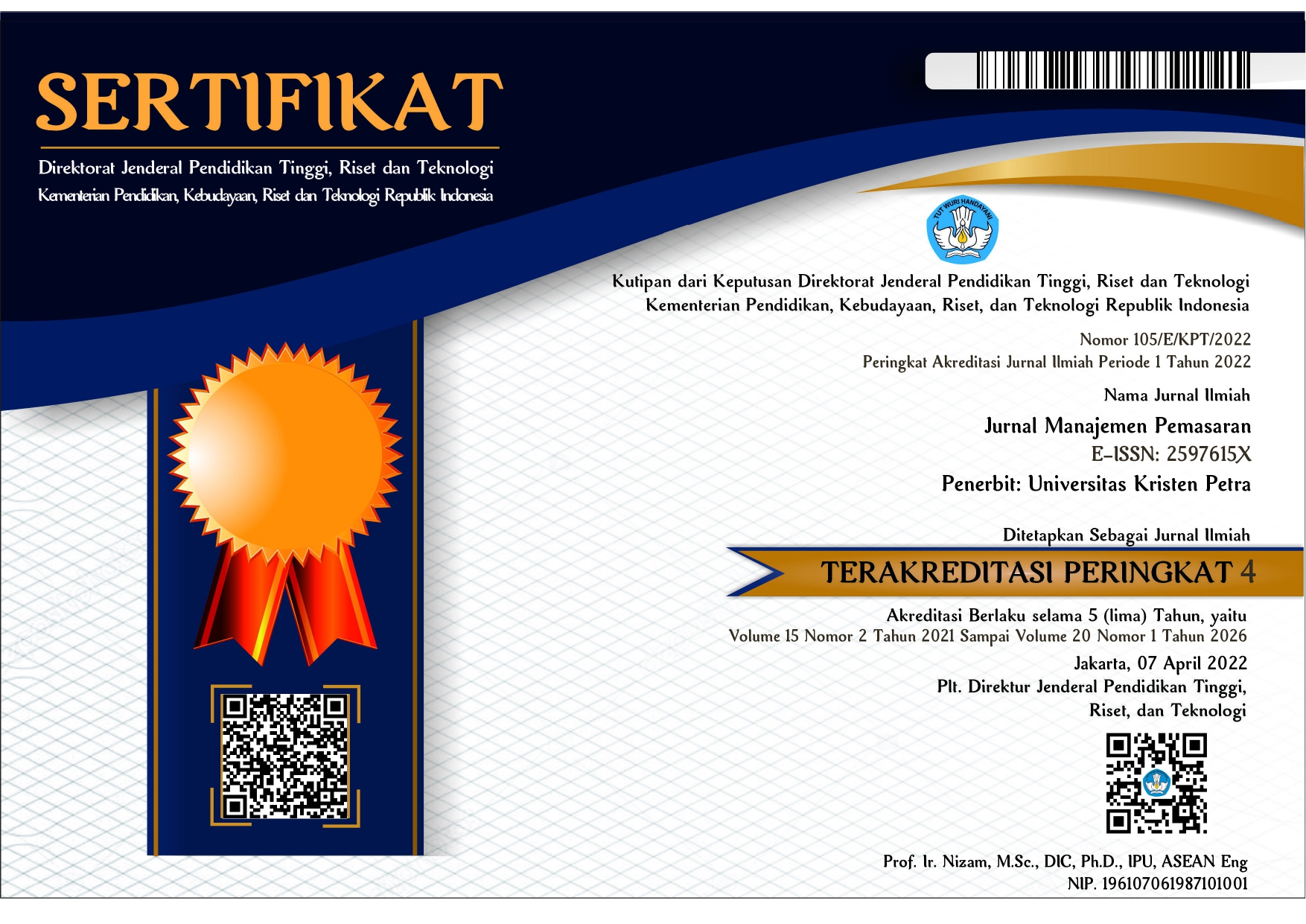PENERAPAN KEBIJAKAN PENGGUNAAN ENERGI LISTRIK TERHADAP KINERJA USAHA MIKRO KECIL DAN MENENGAH DI PROVINSI JAWA TIMUR
 :
:
https://doi.org/10.9744/pemasaran.8.1.39-46
Keywords:
EnergyConservation, Regulation, Organizational Behaviour, Culture.Abstract
Micro, Small, and Medium Enterprise (SME) is one of the main forms thriving business in Indonesia. The use of electrical energy is a decisive component of cost of products. Stimulus by the government through the Indonesian Government Regulation on conservation of energy is a systematic attempt, planned and integrated in order to conserve resources and increase domestic energy utilization efficiency. Such efforts positively impact the business performance of SMEs in Java Timur. Evaluation of energy conservation policies among SMEs, is done through building the concept of government policy as a stimulus to encourage changes in the behavior of individual workers and business systems, which are plotted in organsasi work culture, and impact on organizational performance. The study of 150 SME entrepreneurs in the city of Surabaya and Sidoarjo district shows that there was a positive influence on the energy conservation policy work behavior of individuals and organizations working system, both of which impact positively on the quality of the work culture of the organization and then a positive impact on performance.References
Abrahamse W., Steg L., Vlek C. & Rothengatter T. (2005) A review of intervention studies aimed at household energy conservation. Journal of Environmental Psychology. 25, 273–291.
Bandura, A. (1991). Self-Regulation of Motivation Through Anticipatory and Self Regulatory Mechanism dalam R.A. Dienstbier (ed)., Perspective on Motivation: Nebrasca Symposium on Motivation, 38, Lincoln University of Nobraska Press, 69-164.
Becker L. J., Seligman C., Fazio R. H. & Darley J. M. (1981) Relating Attitudes to Residential.
Byars, L.L. and Rue, L.W. (2000). Human Resources Management.Boston: McGraw-Hill.
Donelly, James H, Gibson, Ivancevich, 1994, Organisasi: Perilaku, Struktur, Proses ed. ke-5,Penerbit Erlangga.
Jackson, T. (2005). Motivating Sustainable Consump-tion; A review of evidenceon consumer behaviour and behavioural change. In: A report to theSustainable Development Research Network as part of the ESRC Sustainable Technologies Programme Centre for Environmental Strategy, University of Surrey, Guildford, UK.
Johnson, Jocelyn J. (2000). Diffences in Supervisor Non Supervisor Perception of Quality Culture and Organizational Climate, Public Personnel Management, 29.
Koskijoki, M. (1997). My Favourite Things, In: Van Hinte, E., (1997). Eternally Yours: Visions on Product Endurance, Rotterdam: 010 Publishers, 132-143.
Kreitner, Robert dan Angelo Kinicki, (2000). Orga-nizational Behavior.4th Ed. Richard D, Irwin Inc. Boston, USA.
Kujala, J. and P. Ullrank. 2004. Total Quality Management as a Cultural Phenomenon. www.asq. org. pp.43-55. Oktober 2005.
Martiskainen, Mari. (2007). Affecting consumer behavior on energi demand.SPRU - Science and Technology Policy Research, University of Sussex.Brighton, East Sussex. BN1 9QE
Narayanan, V.K. dan Raghu Nath, (1993). Organiza-tional Theory.A Strategic Approach. Richard D, Irwin Inc. Boston, USA.
Ployhart, R.E. (2008) The Measurementand Analysis of Motivation dalam Kanfer et al. (ed). Work Motivation Past, Present and Future, USA Taylor & Francis Group, LLC, 18-57.
Rivai, Veithzal dan Basri, M.F.A. 2005. Perfomance Appraisal, Sistem Penilaian Kinerja Karyawan dan Meningkatkan Daya Saing Perusahaan, Penerbit :Raja Grafindo Persada Jakarta.
Russel, Benardin, John, H. 1993, Human Resources Management, New York, Mc. Graw Hill.
Robbins, S.P. 2003. Organizational Behavior, Tenth Edition, Singapore: Prentice Hall.
Simamora, H. (2006). Manajemen Sumber Daya Manusia, Edisi III. Yogyakarta, STIE YKPN.
Tjiptono, Fandy dan Anastasia Diana, (2003). Total Quality Management. Edisi Ke-4. Penerbit Andi, Yogyakata.
Wood, R., and Bandura, A. 1989. Social Cognitive Theory of Organizational Management, Aca-demy of Management Review, 14(3), 361-384.















